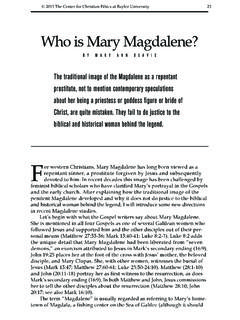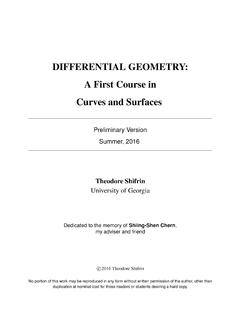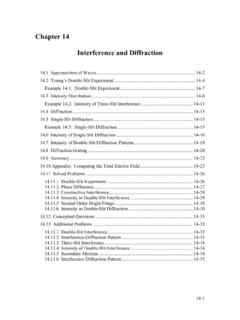Transcription of YOU ARE ACCEPTED - Fractint
1 YOU ARE ACCEPTED by Paul Tillich Moreover the law entered, that the offence might abound. But where sin abounded, grace did much more abound. -Romans 5:20 These words of Paul summarize his apostolic experience, his religious message as a whole, and the Christian understanding of life. To discuss these words, or to make them the text of even several sermons, has always seemed impossible to me. I have never dared to use them before. But something has driven me to consider them during the past few months, a desire to give witness to the two facts which appeared to me, in hours of retrospection, as the all-determining facts of our life: the abounding of sin and the greater abounding of grace. There are few words more strange to most of us than "sin" and "grace.
2 " They are strange, just because they are so well known. During the centuries they have received distorting connotations, and have lost so much of their genuine power that we must seriously ask ourselves whether we should use them at all, or whether we should discard them as useless tools. But there is a mysterious fact about the great words of our religious tradition: they cannot be replaced. All attempts to make substitutions, including those I have tried myself, have failed to convey the reality that was to be expressed; they have led to shallow and impotent talk. There are no substitutions for words like "sin" and "grace."But there is a way of rediscovering their meaning, the same way that leads us down into the depth of our human existence.
3 In that depth these words were conceived; and there they gained power for all ages; there they must be found again by each generation, and by each of us for himself. Let us therefore try to penetrate the deeper levels of our life, in order to see whether we can discover in them the realities of which our text speaks. Have the men of our time still a feeling of the meaning of sin ? Do they, and do we, still realize that sin does not mean an immoral act, that "sin" should never be used in the plural, and that not our sins, but rather our sin is the great, all-pervading problem of our life? Do we still know that it is arrogant and erroneous to divide men by calling some "sinners" and others "righteous?" For by way of such a division, we can usually discover that we ourselves do not quite belong to the "sinners," since we have avoided heavy sins, have made some progress in the control of this or that sin, and have been even humble enough not to call ourselves "righteous.
4 " Are we still able to realize that this kind of thinking and feeling about sin is far removed from what the great religious tradition, both within and outside the Bible, has meant when it speaks of sin ? I should like to suggest another word to you, not as a substitute for the word "sin," but as a useful clue in the interpretation of the word sin : separation." Separation is an aspect of the experience of everyone. Perhaps the word "sin" has the same root as the word "asunder." In any case,sin is separation. To be in the state of sin is to be in the state of separation. And separation is threefold: there is separation among individual lives, separation of a man from himself, and separation of all men from the Ground of Being.
5 This three-fold separation constitutes the state of everything that exists; it is a universal fact; it is the fate of every life. And it is our human fate in a very special sense. For we as men know that we are separated. We not only suffer with all other creatures because of the self-destructive consequences of our separation, but also know why we suffer. We know that we are estranged from something to which we really belong, and with which we should be united. We know that the fate of separation is not merely a natural event like a flash of sudden lightning, but that it is an experience in which we actively participate, in which our whole personality is involved, and that, as fate, it is also guilt. Separation which is fate and guilt constitutes the meaning of the word "sin.
6 " It is this which is the state of our entire existence, from its very beginning to its very end. Such separation is prepared in the mother's womb, and before that time, in every preceding generation. It is manifest in the special actions of our conscious life. It reaches beyond our graves into all the succeeding generations. It is our existence itself. Existence is separation! Before sin is an act, it is a state. We can say the same things about grace. For sin and grace are bound to each other. We do not even have a knowledge of sin unless we have already experienced the unity of life, which is grace. And conversely, we could not grasp the meaning of grace without having experienced the separation of life, which is sin. Grace is just as difficult to describe as sin.
7 For some people, grace is the willingness of a divine king and father to forgive over and again the foolishness and weakness of his subjects and children. We must reject such a concept of grace; for it is a merely childish destruction of a human dignity. For others, grace is a magic power in the dark places of the soul, but a power without any significance for practical life, a quickly vanishing and useless idea. For others, grace is the benevolence that we may find beside the cruelty and destructiveness in life. But then, it does not matter whether we say "life goes On," or whether we say "there is grace in life"; if grace means no more than this, the word should, and will, disappear. For other people, grace indicates the gifts that one has received from nature or society, and the power to do good things with the help of those gifts.
8 But grace is more than gifts. In grace something is overcome; grace occurs "in spite of" something; grace occurs in spite of separation and estrangement. Grace is the reunion of life with life, the reconciliation of the self with itself. Grace is the acceptance of that which is rejected. Grace transforms fate into a meaningful destiny; it changes guilt into confidence and courage. There is something triumphant in the word "grace": in spite of the abounding of sin grace abounds much more. And now let us look down into ourselves to discover there the struggle between separation and reunion, between sin and grace, in our relation to others, in our relation to ourselves, and in our relation to the Ground and aim of our being.
9 If our souls respond to the description that I intend to give, words like "sin" and "separation," "grace" and "reunion," may have a new meaning for us. But the words themselves are not important. It is the response of the deepest levels of our being that is important. If such a response were to occur among us this moment, we could say that we have known grace. Who has not, at some time, been lonely in the midst of a social event? The feeling of our separation from the rest of life is most acute when we are surrounded by it in noise and talk. We realize then much more than in moments of solitude how strange we are to each other, how estranged life is from life. Each one of us draws back into himself. We cannot penetrate the hidden center of another individual; nor can that individual pass beyond the shroud that covers our own being.
10 Even the greatest love cannot break through the walls of the self. Who has not experienced that disillusionment of all great love? If one were to hurl away his self in complete self-surrender, he would become a nothing, without form or strength, a self without self, merely an object of contempt and abuse. Our generation knows more than the generation of our fathers about the hidden hostility in the ground of our souls. Today we know much about the profusive aggressiveness in every being. Today we can confirm what Immanuel Kant, the prophet of human reason and dignity, was honest enough to say: there is something in the misfortune of our best friends which does not displease us. Who amongst us is dishonest enough to deny that this is true also of him?







